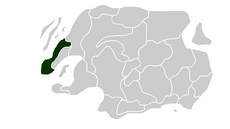| Kingdom of Resha | |
| Reshask Kelingel | |
| Capital (and largest city) |
Hederhelm |
| Official languages | Reshan |
| Recognized minority languages | Titovanian Velkanian |
| Ethnic groups | –87% Reshans –5% Velkanians –5% Titovanians –3% others |
| Demonym | Reshan |
| Government | Unitary parliamentary constitutional monarchy |
| Leaders | –Prime Minister: Stefania Chulgrol –Monarch: Sabina II |
| Independence | –Constitution ratified: 23 March 1623 |
| Population | 18,232,850 (2017 estimate) |
| Currency | Reshan Vaster |
Resha (Reshan: Resha), officially the Kingdom of Resha (Reshan: Reshask Kelingel), is a country located in Northwestern Pravia. It has a population of 18,232,850. Its capital and largest city is Hederhelm.
Resha is a parliamentary constitutional monarchy, which was established following the unification of Reshan-speaking city-states on 23 March 1623. Resha is a unitary state, consisting of eighteen counties, further subdivided into municipalities.
Indigenous people of Resha are known as Reshans. Reshans make up about 87% of the Reshan population. During the time of colonization, many Velkanians moved to the country, and currently make up about 5% of the population, along with ethnic Titovanians who live along the border with Titovania, while 3% consists of other nationalities, mainly immigrants.
The sole official language of Resha is Reshan, a member of the Jeger language family. Reshan is spoken natively by the majority of the population. Titovanian and Velkanian are recognized as official minority languages.
History[]
Geography[]
Politics[]
Administrative divisions[]

Resha is a unitary state, divided into eighteen first-level counties. The counties are administrated through democratically-elected county assemblies, who elect a county governor. These counties are further divided into second-level municipalities. Municipalities are administrated through democratically-elected municipal councils
There are fifty-four populated places with city status. Cities form their own municipalities and are run by a democratically-elected mayor and a municipal council. Municipalities contain an administrative center and surrounding towns.
| County | Capital | Population (est. 2017) |
Region |
|---|---|---|---|
| Hvormans | Lovlork | 687,450 | Eastern Resha |
| Lagers | Mandak | 746,140 | Eastern Resha |
| Sharsta | Helpa | 745,120 | Eastern Resha |
| Jakvo | Rongeim | 536,350 | Eastern Resha |
| Travaland | Farstabrok | 679,420 | Southern Resha |
| Elin | Riffer | 2,629,320 | Southern Resha |
| Myla | Emilet | 1,592,350 | Southern Resha |
| Hederhelm | City of Hederhelm | 2,932,430 | Western Resha |
| Leverhan | Riksur | 3,042,340 | Western Resha |
| Smindal | Kamendal | 2,569,140 | Western Resha |
| Kammerman | Ova | 1,042,240 | Western Resha |
| Osma | Trindal | 395,360 | Northern Resha |
| Grengro | Arenell | 104,630 | Northern Resha |
| Svender | Smalgo | 102,460 | Northern Resha |
| Kevo | Trifer | 124,590 | Northern Resha |
| Finsdark | Dane | 132,940 | Northern Resha |
| Smardan | Malnorn | 118,130 | Northern Resha |
| Eko | Smelst | 52,440 | Northern Resha |
Economy[]
Demographics[]
Largest cities[]
The largest city in Resha is Hederhelm, the second-largest is Emilet, and the third-largest is Riffer.
| # | City | County | Population (est. 2017) |
|---|---|---|---|
| 1 | Hederhelm | Hederhelm | 1,621,240 |
| 2 | Emilet | Myla | 1,020,510 |
| 3 | Riffer | Elin | 1,003,320 |
| 4 | Ova | Kammerman | 789,640 |
| 5 | Riksur | Leverhan | 723,520 |
| 6 | Luf | Elin | 723,230 |
| 7 | Por | Leverhan | 656,140 |
| 8 | Elber | Leverhan | 581,360 |
| 9 | Kamendal | Smindal | 524,450 |
| 10 | Helmdat | Hederhelm | 502,430 |
Education[]

The Faculty of Fine Arts building of the University of Resha in Hederhelm.
Main article: Education in Resha.
Higher education in Resha is offered by a range of thirteen public universities and several polytechnic universities throughout the country. The education system consists of Bachelor (2–4 years), Master (2 years), and PhD (3 years) degrees. Acceptance to universities is offered after completing high school with general study competence.
Public education is completely free for all nationalities, and funded through taxes. The academic year consists of two semesters; from September to January, and from February to June. There are several private schools throughout Resha which operate independently from the government and may offer different experiences; such as different semester schedules, tuition rates, and a core specialization.

